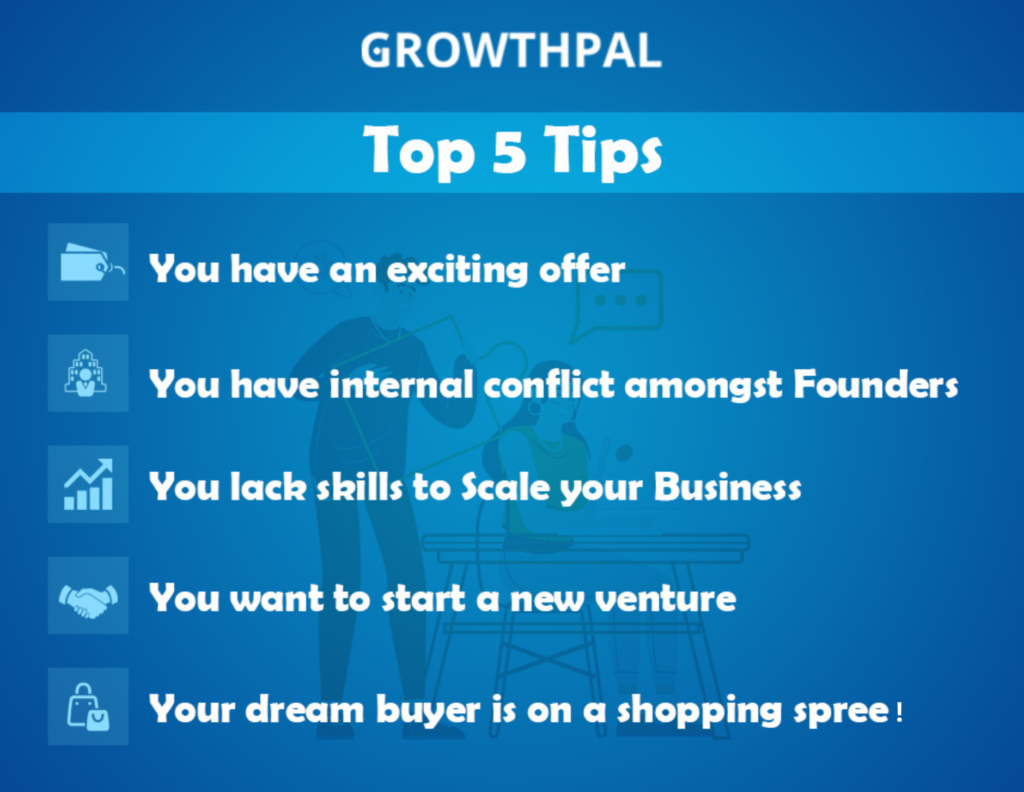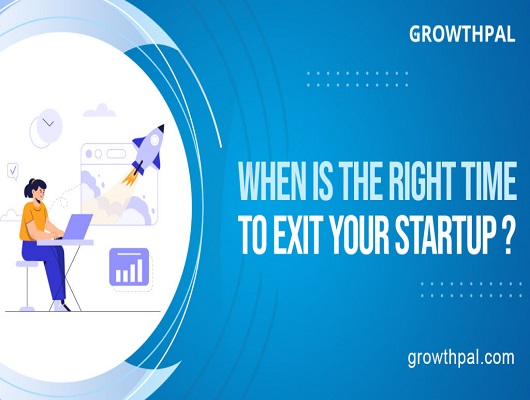When is the right time to exit your startup?


As a founder, exiting your startup can feel like walking on an edge of the tallest mountain – you know that with just one wrong move, it could all come crashing down.
You have been turning an idea into a reality, brick by brick, for years; but with change in market dynamics, whether technology upgrade or demand supply cycle, your business might freeze out and you might wonder what can be the next smart move that compensates you for the efforts that you have invested in growing the business, for years, sometimes decades too!
While standing at such a dichotomic but delicate thread, where you are perplexed with– “Should I stretch more and get my business on track or should I let go of the business and fetch out possible benefits,” there comes a point where you need to make rational decisions that can benefit you in the long run!
When is the right time to take that leap? Of course, there’s no crystal ball that tells us the best time to sell our companies — but there are certain indications we should pay attention to in order to make an informed decision.
Thankfully, we’ve created this blog post specifically for founders, CEOs and Corpdev Heads in order to help with better understanding the decision making process behind knowing when it’s best to exit your startup.
Read on for our top five tips!


1. You have an exciting offer:
When it comes to exiting a startup, the decision to do so is often influenced by a variety of factors. One of the most common reasons for exiting a startup is to take advantage of an exciting offer that can help grow the business at a much faster pace. This offer typically comes from a buyer who brings a fair advantage to the table, such as market access, capital flow, industry networks, or other resources that can benefit the startup.
There are several reasons why buyers are interested in purchasing a growing business. One of the main reasons is that a growing business has a better chance of generating higher profits in the future, which translates to better returns for the buyer. Additionally, a growing business is often seen as a safer investment than a startup that is struggling to gain traction.
When a buyer is interested in purchasing your growing business, you can expect to receive a better valuation of your business. This is because the buyer sees the potential for growth and is willing to pay a premium for the opportunity to acquire the business.
2. You have internal conflict amongst Founders:
Differences in vision, goals, or management styles can lead to tensions that can be difficult to resolve. If you are in this situation, it’s important to remember that you are not alone, and that there may be a solution that can help you move forward.
One potential solution to consider is letting go of your startup. While this may not be the right option for everyone, it can provide an opportunity to move on from the conflict and start fresh with new projects or more prosperous opportunities. Additionally, exiting your startup can provide a financial benefit if the business has a positive valuation.
Of course, it’s important to approach this decision with care and consideration. It’s also important to consider the impact on stakeholders, such as employees, customers, and investors.
Whether you choose to exit your startup or pursue other solutions, know that there are resources and support available to help you succeed. A digital investment banking platform with deal sourcing expertise can be of vital help.
3. You lack skills to Scale your Business:
If you find yourself unable to scale your business as planned due to a lack of skills or expertise, it can be a frustrating and demotivating experience. However, it’s important to remember that exiting your startup can be a viable and smart option for many entrepreneurs in this situation.
This can provide you with an opportunity to exit the business while still realizing a return on your investment. It also allows you to hand over the reins to someone with the skills and expertise needed to take the business to the next level.
But, before you press the exit button, it’s important to conduct a thorough evaluation of your business and its potential value. This might involve seeking the advice of deal sourcing platforms that have a deep IB network, while taking into account several factors such as market trends, revenue growth, and competitive landscape.
Ultimately, the decision to exit is a deeply personal one that should be based on a careful consideration of your goals and priorities. But for entrepreneurs who are struggling to scale due to a lack of skills or expertise, selling their startup can be a wise and financially rewarding decision.
4. You want to start a new venture:
Standing at a crossroads where you are considering selling your current business to pursue a new venture? This can be a difficult decision. But it’s important to remember that selling your startup can provide you with the capital and resources needed to embark on a new entrepreneurial journey.
Starting a new venture can be a risky and expensive undertaking, and having the financial cushion provided by a successful sale can help you mitigate some of those risks. It can also provide you with valuable lessons and insights that you can apply to your new venture, and help you avoid making the same mistakes twice.
However, it’s important to carefully consider your motivations for selling and ensure that you are not simply running away from a difficult or challenging situation. Be sure to have a solid plan in place for your new venture, and seek the advice of trusted mentors or M&A advisors before making any major decisions.
Remember, there is no right or wrong time to exit your startup. Ultimately, the decision should be based on a careful consideration of your goals and priorities, and a commitment to doing what is best for yourself and your business.
5. Your dream buyer is on a shopping spree!
When buyers are shopping around for companies like yours, it’s also beneficial to know how long similar businesses take to sell and what factors are likely to influence their decisions. This way, you stay ahead of competing firms and demonstrate why investing in your business would be a wise move.
To make sure your company stands out from the competition, it’s important to invest in improvements and make sure you have an impressive financial performance before presenting yourself as an attractive option for a buy-out. Additionally, doing research on current trends and staying up-to-date with potential opportunities will go a long way towards catching buyer attention.
By understanding which selling techniques may be more effective for particular types of buyers, you can make sure you present yourself in a way that meets their needs and objectives.
Wrapping Up
If you’re seeing any of these warning signs in your startup, it’s time to take action.
You don’t want your startup to become a statistic. GrowthPal can help you exit your startup with high value by finding the right buyer for your company. We have a proven track record of success and we’d love to help you too. Contact us today to learn more about how we can help you avoid failure and achieve success.









